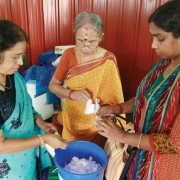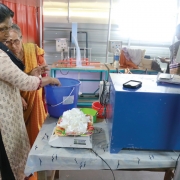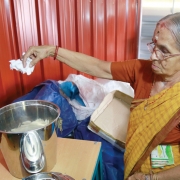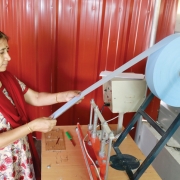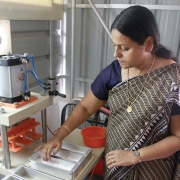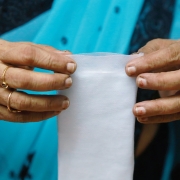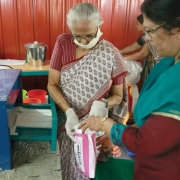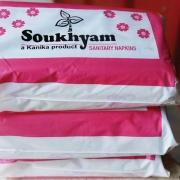
People
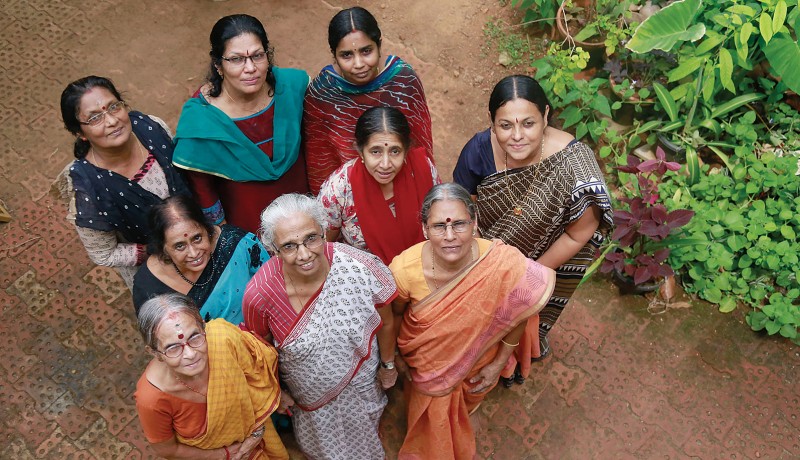
A group of women in Thrissur, Kerala, is trying to make ‘sustainable menstruation’ a reality, reports Renu Ramanath
Vasanthi Gopalan and her colleagues couldn’t have found a better way to celebrate International Women’s Day last year. On 8 March 2016, this group of silvers from Thrissur in Kerala rolled out their first batch of low-cost, biodegradable sanitary napkins, a product that is transforming the lives of women who use it.
Labelled ‘Soukhyam’, or ‘well-being’ in Malayalam, these sanitary napkins are the result of a dream backed by the determination to see it through, says 78 year-old Gopalan, founder of the NGO, Kanika, and wife of the late Dr K Gopalan, former vice-chancellor of Cochin University of Science and Technology.
Given the increasing concerns about the chemical components that go into making industrial sanitary napkins, especially dioxins (a toxic chemical used in the bleaching process), Kanika’s initiative comes not a moment too soon. It is also part of a social revolution taking place across the country, especially rural India, where the focus on menstruation and women’s hygiene is slowly gathering momentum.
The idea took root when Gopalan read a news item in a local newspaper two years ago. It featured Arunachalam Muruganantham—the ‘Sanitary Napkin Man’ of Tamil Nadu—who made waves when he launched eco-friendly sanitary pads in 2006. Muruganantham invented the technology to make biodegradable sanitary napkins after much trial and error, even suffering the pain of being called a ‘pervert’. His Coimbatore-based company Jayaashree Industries has since sold his cost-effective machines across India and even overseas. “We supply machines and raw materials [wood pulp] to about 20 places in Kerala—both NGOs and individuals—as well as overseas,” says Kannan, a trainer at Jayaashree Industries. “Our raw material comprises wood pulp that is imported. We had also collaborated with Akhilesh Yadav, former chief minister of Uttar Pradesh, to initiate a project on menstrual hygiene in rural areas.”
Kanika was inspired to follow in Muruganantham’s footsteps. “We mulled over the idea for a year,” says Gopalan, seated in her residence in Chembukkavu, a suburb of Thrissur. A year later, in 2015, the women of Kanika contacted Muruganantham to obtain the technology from him. He supplied them with the raw material and arranged for two people to set up the unit in Thrissur.
The biggest roadblock for the women was raising funds as they were adamant about not taking a loan for their venture. Around 20 of them, therefore, contributed their own funds, and collected ₹ 500,000. They also sought the support of the National Bank for Agricultural and Rural Development (NABARD) and the District Industries Centre, Thrissur, which trained them in running a small-scale industrial unit.
The next challenge was to find a suitable workspace. That’s when one of Kanika’s members, Nandini Venugopal, invited them to use the space on the terrace of her home in Peringavu, a suburb of Thrissur. “We started production in that makeshift room and came out with our first batch of napkins in 2016,” says Gopalan, who adds that they continue to use the same workspace at a monthly rent of ₹ 5,000.
Gopalan shares that the raw material, mainly gel cotton and wood pulp, comes from Jayaashree Industries. It is turned into a mixture and poured into moulds. The mixture is then compressed into long strips, sealed with degradable material and sterilised before being wrapped and packaged. Priced at ₹ 43 for a pack of 10 napkins, the finished product looks every bit like the commercially produced one. “While pricing the product, we chose to only include the cost of raw material and not our labour,” says Girija Kesavan, one of Kanika’s members. Around 20 members of the NGO are engaged in making sanitary napkins; as they are silvers, the team keeps their schedule flexible. “We work in shifts and produce around 200 packets a month,” says Indira Unni, another active member. “We are happy to work on our own and have thus never thought of expanding by way of employing people or creating job opportunities.”
Of the 200 packets produced every month, most of them are distributed free on a charitable basis. “There’s very little money coming from the sale of napkins,” reveals Gopalan. “Besides, our costs include rent and the electricity bill. However, we are slowly beginning to recover our cost by way of donations from members and well-wishers.”
Word about the quality and low price of Soukhyam sanitary napkins is slowly spreading and the venture has started to attract some regular buyers, including the women in their own families. “There are two men who buy some packets to be distributed in their neighbourhood, through Kudumbashree units [a community organisation run by the Kerala government],” adds Gopalan.
As for the women who use them, they say the product is life-changing. Bindu R, 37, who works with Kanika in her free time, reveals, “Before I switched to Soukhyam, I had been using the traditional cloth pad regularly, and commercial pads when travelling. Now, I find these napkins very comfortable. Except for the blue plastic shield, all the other materials used are natural. The only drawback is that Soukhyam’s napkins don’t have wings. But we are now trying to incorporate this design element.”
Shameem A T, an accountant, is very grateful to this small band of women change-makers. For years, she had been suffering from a skin rash, an allergic reaction to almost all the brands of sanitary napkins produced commercially. When she switched to Soukhyam four months ago, she was astonished. “Earlier, every month, I would visit the skin specialist and gynaecologist,” she says. “The eco-friendly nature of these handmade sanitary napkins has caused the allergy to subside.”
It’s not only women like Shameem whose lives are enriched. Gopalan points out that Kanika’s Soukhyam venture is in keeping with the motto of the NGO: ‘Life begins at 50’. It is meant to give meaning to the silver women of Kanika, which started as the Thrissur chapter of the All India Women’s Conference, six years ago.
THE SANITARY WASTE FACTSHEET
9,000 tonne
of sanitary waste (432 million pads) is generated every month and 108,000 tonne of menstrual waste is produced every year in India
500 years
is the time taken for disposable pads made of synthetic materials to decompose
150 kg
of non-biodegradable absorbents is thrown away by an average woman every year
80%
or more of sanitary waste is flushed down the toilet or dumped in a landfill
WHY ECO-FRIENDLY SANITARY NAPKINS
- Biodegradable
- Lower cost
- No chemical or toxin components
- Skin-friendly
- Accessible to rural women
- Source of income for small-scale manufacturers
BREAKING THE TABOO
Women’s health, sanitation and hygiene have been largely ignored in India, and bringing them into focus has largely been the preserve of private initiatives and global bodies like UNICEF. Just how backward are we in this area?
A 2011 survey conducted by A C Nielsen on behalf of UNICEF in rural Bihar and Jharkhand revealed these disturbing results: only 12 per cent of women in India use sanitary napkins; the remaining 88 per cent use old rags, leaves, newspapers, even sand, during their periods. Lack of menstrual hygiene thus leads to 70 per cent of women suffering from skin infections.
Over the years, NGOs, sometimes along with government agencies, have been trying to make a difference by raising awareness on menstruation and distributing low-cost sanitary napkins in different parts of the country. Some, like Arunachalam Muruganantham and Kanika, have gone a step further and are manufacturing an eco-friendly product. It was, therefore, a shot in the arm when the Central Government unveiled the Menstrual Hygiene Management Guidelines in December 2015, as part of its Swachh Bharat Mission. These guidelines outline what needs to be done by state governments, district administrations and schools to raise awareness on menstruation.
“The Central Government has taken up menstrual hygiene as a priority issue for improving the reproductive health of women,” says Dr Beena K V, Public Health Consultant, Amritha Hospital, Ernakulam. “The Government is now focusing on teenagers. More and more NGOs are supporting this movement by helping set up sanitary napkin vending machines in many schools in Kerala where students can get napkins priced at ₹ 2 per pad. Some NGOs are also helping set up incinerators in schools.”
Photos: Sivaram V Featured in Harmony — Celebrate Age Magazine June 2017
AGRICULTURE
FORESTS
WILDLIFE
WATER
WASTE MANAGEMENT
ENERGY
EXCLUSIVE COLUMN
EXCLUSIVE COLUMN
A STEP-BY-STEP PROCEDURE FOR MAKING ECO-FRIENDLY SANITARY NAPKINS
you may also like to read
-
For the love of Sanskrit
During her 60s, if you had told Sushila A that she would be securing a doctorate in Sanskrit in the….
-
Style sensation
Meet Instagram star Moon Lin Cocking a snook at ageism, this nonagenarian Taiwanese woman is slaying street fashion like….
-
Beauty and her beast
Meet Instagram star Linda Rodin Most beauty and style influencers on Instagram hope to launch their beauty line someday…..
-
Cooking up a storm!
Meet Instagram star Shanthi Ramachandran In today’s web-fuelled world, you can now get recipes for your favourite dishes at….



